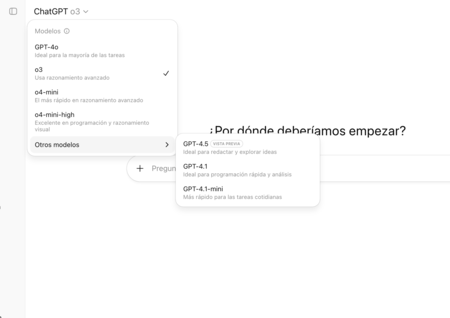GPT‑4.1, GPT‑4.5, GPT‑4.1-min, o4-min, o3, 3-pro.
If these names do not sound at all, you are not alone. Despite its popularity, a large part of Chatgpt users He never touched the model selector. Some knew that he was there, but beyond a brief description in the drop -down, few really understood what each one served. And yet they used it daily.
Most likely, for months you have lived with the default base -GPT -4o model, that Openai described as “ideal for most tasks” – without exploring anything else. Someone may ever try, just to discover that the results were not so different or that that was not what he was looking for. In the end, everything remained in the hands of a few advanced users, those who knew how to squeeze those other models to obtain better results.
The model selector was a wall for many
For a long time, using chatgpt meant making a decision that not everyone was prepared to take. What model choose? Which was better to program? And to write? What if I needed to analyze data?
Openai offered a list, a brief and, hopeless description, some generic recommendation. But the only real way of understanding nuances was to experiment. Change model, try, compare results, change again. A process that demanded time and criteria.
In an environment where we ask for immediate results, that was an invisible but real barrier. The majority stayed where he was. And the most curious thing is that even paying the subscription, many never used the options that were included.
You don’t have to choose anymore. With the arrival of GPT -5, The model selector disappears for free users and loses relevance even among payment. Openai has designed a system that decides by the user: the new model knows when he has to think more and when he is not needed. If the task requires complex reasoning, GPT -5 takes it easy. If it is simple, respond instantly.

The old chatgpt model selector, today already out of the scene
This changes the rules of the game. Not only because it saves unnecessary time and decisions, but because it finally places intelligence where it should be from the beginning: at the user’s service, without having to know how it works inside.
GPT -5 behaves more similar to us. Not because he is aware, much less, but because Start deciding in real time If a task requires thinking or not. As we do.
When someone asks us a simple question, we answer quickly. When something demands analysis, we take a few more seconds. That is the logic that begins to replicate this model: if it takes effort, it applies it. If not, prioritize speed.
GPT -5 behaves more similar to us
In the background, that was what we expected of an advanced artificial intelligence. That understands us without giving technical instructions. That anticipates, That chooses by themselves how to help us better.
That the model decides on your own does not mean that we have lost control. In fact, payment users can still manually force the type of response they want.
From the chatgpt interface, the mode of reasoning with a button can be activated. But it can also be done with a simple instruction in the message: “Think about it”, “do it fast”, “give me a light answer” … the system interprets these phrases and adjust your behavior.


It is a subtle, but important change. Because although GPT – 5 self -managed, It is still possible to intervene and refine experience. Whoever wants depth, can ask for it. Who wants immediacy, too.
For those who use chatgpt intensively – at work, in studies, in complex tasks – this change has direct consequences.
Before, a user could be paying for a tool that he did not understand at all, without knowing that he was using only part of his potential. Now, even if I don’t have time to experience or learn how everything works, GPT -5 does that job for him.
The difference between those who knew how to combine models and who did not, between those exploring each variant and who They stayed on the surfaceit has been reduced. From now on, the quality of experience will depend much more on how we ask for things that we know or not what a model to use.

And that is good news, especially for those who never touched the selector. Users who, without changing anything in their way of interacting, will begin to get better, more adjusted, more useful answers. GPT -5 brings them out to the advanced ones without having to move a finger.
GPT -5 does not add a new function. Correct an old incoherence. Until now, the most powerful system I was hidden after technical decisions that few knew how to take.
Images | WorldOfSoftware with Gemini 2.5 Flash | WorldOfSoftware screen capture
In WorldOfSoftware | The AI has so far a nice accessory: with GPT-5, OpenAi wants to place it in the center of all things












